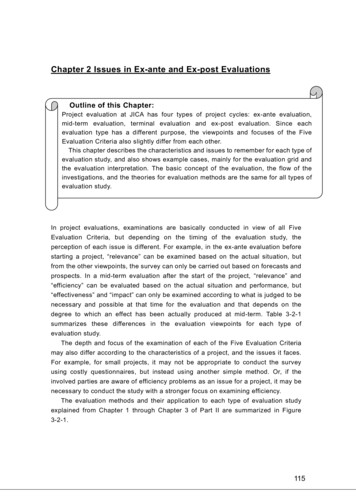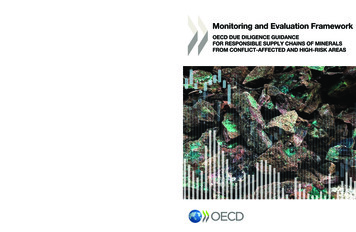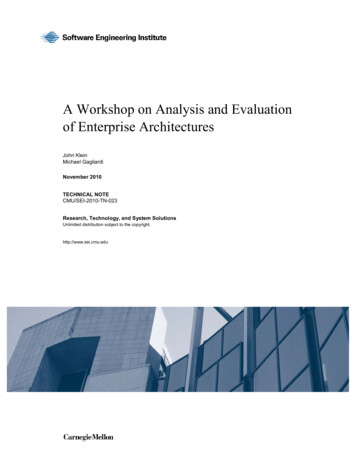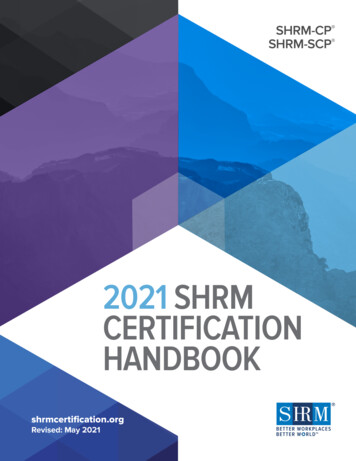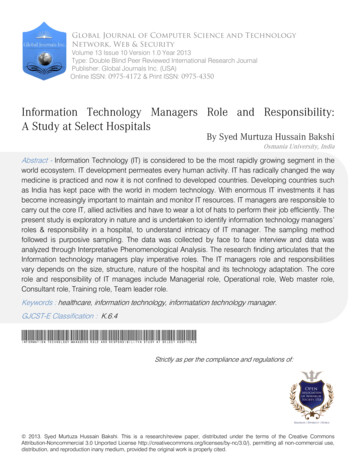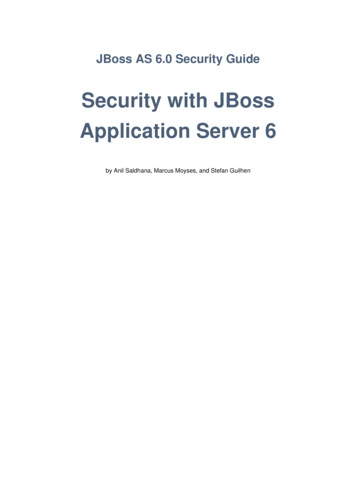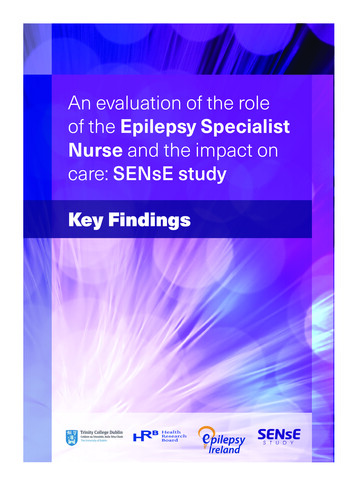
Transcription
An evaluation of the roleof the Epilepsy SpecialistNurse and the impact oncare: SENsE studyKey FindingsKey findings 8.indd 124/01/2017 10:11
The SENsE ReportThe SENsE Report1 (Higgins et al.2017) details the findings of a nationalstudy into the role, impact and costeffectiveness of the Epilepsy SpecialistNurse (ESN) in Ireland. An ESN is amember of the multidisciplinary team(MDT), has specialist education andexpertise in epilepsy, and plays a keyrole in the management and supportof people with epilepsy across primary,secondary and tertiary care.This ‘Key Findings’ report outlines someof the major findings of The SENsE study.Some facts about epilepsyand epilepsy care pilepsy is the most commonEneurological conditionAffects all agesTreatable condition Majority of people with epilepsy areseizure free 37,000 people in Ireland over the ageof 5 years have epilepsy Estimated 10,000 people in Ireland livewith controlled epilepsy Epilepsy is not just a medicalproblem, but a complex condition withpsychological and social challenges Epilepsy may impact on education andemployment, and may affect social,cognitive and emotional well-being Early diagnosis and responsive carefrom a skilled multidisciplinary teamimproves health outcomes In 2014 the National Clinical CareProgramme in Epilepsy Care (NECP)recommended that every Person withEpilepsy (PWE) has access to an ESNat Advanced Nurse Practitioner (ANP)levelStudy AimsFunded by the Health ResearchBoard and Epilepsy Ireland the studyaims were to: valuate the impact of theeESN on patient and familyexperiences, satisfaction withcare and service delivery; identify the scope of the ESNrole within the multidisciplinaryhealthcare team; and assess the cost-effectiveness ofthe ESN role.Study DesignA mixed methods study thatgathered data using differentmethods and a variety of sources: Interviews with 12ESNs, 22 members ofthe multidisciplinaryteam, 21 PWE and14 family members Surveys with 605 PWEwho were attendingESN and Non-ESNservices 6 1 hours of observationof 12 ESNs Documentary evidencein 5 different sitesThe SENsE study was conducted by a research team led by Prof. Agnes Higgins from the School of Nursing & Midwifery,Trinity College Dublin. This report was launched by the Minister for Health Mr Simon Harris, TD, in February 2017. The fullreport of the study is available at www.epilepsy.ie and www.nursing-midwifery.tcd.ie/1 Key findings 8.indd 224/01/2017 10:11
Profile of ESNsinvolvedThe 12 ESNs included were experiencedand well-qualified clinical practitioners,some of them with extensive experiencein the field. They were nursing forbetween 12-34 years, and were workingin their current role between 3 and 21years. Two were registered as RANPs,five were candidate ANPs, and five wereClinical Nurse Specialists (CNSs). Inaddition to being registered generalnurses, 1 was a registered midwife, 2were registered in intellectual disability(ID) nursing, 4 were registered inchildren’s nursing and 7 were registerednurse prescribers with the Nursing andMidwifery Board of Ireland. All ESNshad gained a number of professionaland academic qualifications that directlyinformed their practice in epilepsy.Services providedby ESNsAlthough there were geographicdifferences in relation to the servicesprovided, collectively the ESNs provided avariety of services to PWE across the carecontinuum including: Nurse-Led Clinics Rapid Access Clinics Vagal Nerve Stimulation Clinics (VNS) Telephone Advisory Services Outreach ServicesPeople withepilepsy across theage continuumPregnantwomenPeople living incare homesKey findings 8.indd 3The ESNsprovidedcare andsupport toPeople withpsychologicalhealth challengesPeople withan intellectualdisabilityPeople withco-morbid physicalhealth problems24/01/2017 10:11
Impact of ESNA synthesis of the findings from all thedata sources indicate that the ESNs, aspart of a multidisciplinary team, impactedpositively on the lives of PWE, familymembers and significant others, MDTand services.Impact on PWE· Enhanced knowledge of epilepsyand epilepsy related issues· Enhanced confidence toself-manage· Improved sense of involvement incare· Improved co-ordination of care· Improved satisfaction with care· Enhanced preparedness for testsand investigations· Increased prompt identification ofproblems· Enhanced psychologicalwell-beingImpact on family members andsignificant others· Increased family members’confidence to support PWE· Decreased subjective andobjective burden experienced byfamily· Increased general public’sconfidence to support PWEKey findings 8.indd 4Impact on MDT· Increased knowledge on epilepsyand epilepsy care· Informed decision-making ondiagnosis and treatment· Enhanced communicationbetween healthcare practitioners,across disciplines and services· Promoted evidence-basedpractice· Supported and developed futureESNs and candidate ANPsImpact on services· Increased the number and rangeof services available to PWE· Increased access to specialistepilepsy care by decentralisingservices· Improved continuity of care andpatient flow· Reduced attendance at EDdepartments· Increased use of ElectronicPatient Record24/01/2017 10:11
Scope of ESN roleClinical roleThe clinical aspect of the ESN role wasunderpinned by the principles of holistic personcentred care, continuous assessment, responsiveaction, empowerment and collaboration with thePWE, their family members and the MDT. Theclinical role required a high degree of epilepsyspecific knowledge, including knowledge of localand national services and absorbed the vastmajority of the ESN’s time.As core members of the MDT,the ESN’s clinical role included:Leadership roleThe ESNs were involved in clinical and professionalleadership, at both a strategic and patient-level, andnegotiating change across disciplinary, managerialand organisational boundaries. As leaders theywere very self-directed and motivated individuals,and were guided by beliefs in equality of access,the right to service quality, collegiality of workingrelationships, and the importance of mentorshipand support for all members of the MDT within andoutside of their service.As leaders, the ESNs were improving the quality ofcare for PWE and influencing policy and practice by:Evidence-based practice roleWhilst the clinical and leadership dimensions ofthe ESN role took priority over producing research,the ESNs were all engaged to varying degrees inpromoting evidence-based practice (EBP) amongMDT members, PWE, their family and the public.The ESNs were promoting EBP by:Qualityassuring patientinformationrecordedProviding a rangeof services acrosscare continuumClinicalroleCo-ordinatingcare and carepathwayProvidingpsychosocial careto PWE andfamilyDeveloping andmentoring ESNsand candidateANPsInfluencingpolicy andpractice throughcommitteemembershipSystematicallymonitoring impactof care andtreatmentDevelopingguidelines,protocols andcare pathwaysLeadershiproleAdvocating forthe PWE voiceto be heard withinand outside theserviceImplementingand enhancingthe developmentof the ElectronicPatient RecordDevelopingeducationalresources forPWE, family andpublicAccumulatingevidence throughformal & nce throughformal andinformalprocessesEvidence-basedpractice roleGeneratingevidence throughaudit andresearchKey findings 8.indd 5Providingeducation toPWE and family/significantothersExpanding anddeveloping newservicesBuildingcapacity of theMDT within andacross servicesin epilepsycareCompletingcomprehensiveassessment ofPWE and familyneedsApplyingevidence toeducate, defendpractice or arguefor changeTranslatingevidence into anaccessible form forPWE, family andMDT24/01/2017 10:11
Stakeholders’ views of the ESN“The patient needsis their focus, and it isabout safer care beingdelivered to the patient.”(Director of Nursing)“The [ESN] is ringing meup, checking medication,listening to me, making suremy [seizure] diary is perfect.She understands me, knowsme, there to help me makedecisions.” (PWE)“They’re like anotherfamily that you never knewyou had, and they’re alwaysthere.” (PWE)AmazingLink personEmpatheticReassuringTrustSafer careFantasticComfortingExperiencedChange champions“[ESNs] have their owncohort of PWE, so there’scontinuity in your care that’s invaluable.”(Medical personnel)IncredibleSystematic“She’s [ESN] giving metools, gives the confidenceand reassurance that you canhelp your child [when he hasseizure] helps you cope.”(Family member)ConfidenceKnowledgeableInvaluableKnow youSupportiveLike Family“Because of herknowledge of how theepilepsy system worked, sheis able to ease the pathway ofinformation between us andprimary care and vice versa she provides a conduit formultidisciplinary care.”(Medical personnel)“The [ESNs] are thepeople who pick up alot of the psychologicaldifficulties , they’re the oneswho are on the phone at thecoal face they know thepatients [PWE] really well ”(Allied health professional)Key findings 8.indd 6They [ESNs] area huge knowledgereservoir, and a hugesupport to PWE andtheir families.”(Medical personnel)“We use the Electronic Patient Record, andthe nurses really championthat they are instrumentalin making sure that it is usedproperly.we would be using ita lot less if the nurses hadn’tadvocated for it.”(Medical personnel)24/01/2017 10:11
Cost and Contextual FactorsCost-effectivenessPWE included in this study who receivedcare from an ESN, had the same costsas those treated in a Non-ESN site butexperienced better outcomes in termsof their knowledge and the managementand treatment of their epilepsy. Thiswould suggest that sites with an ESNare good value if they improve thepatient experience at no change incost. In addition, a change in skill mixwas observed for ESNs as they took onsome of the roles traditionally underthe remit of the medical consultant. Assuch, the ESN role reduced thetime medical consultantsspent dealing with issues,enabling them to utilisetheir time more efficiently,with potential cost savingimplications.Contextual factorsinfluencing roleSupporting role presence of national policies on role strong support for the role amongmedical and nursing personnel positive appraisals of ESNs’competence by all stakeholders presence of formal and informalsupport mechanisms acceptance of the ESN role by PWEand familiesChallenges to role large clinical caseloads/role overload lack of ‘critical mass’ of ESNs withinsome services role isolation limited access to structural supportsand resources demands of achieving thecompetencies and other requirementsto become a registered ANP lack of acceptance of the ESN role byPWE and familiesRecommendationsThis mixed methods evaluation hasdemonstrated very positive outcomes of theESN role for PWE, their families, members ofthe MDT and the health service; therefore, it isrecommended that: the ESN service be expanded nationally; a critical mass of ESN posts (no fewer than3) be created in all services; specialist ESN services in the areas ofwomen’s health, ID, children/adolescents,mental health and older age be expanded;Key findings 8.indd 7 eficits in structural and professionaldsupports be addressed and; further evaluation be undertaken in 5-7years, using the outcome indicatorsidentified in this research to measure theimpact of the ESN role.The full list of recommendations is availablein the SENsE report.24/01/2017 10:11
Acknowledgment:The research team thanks all the stakeholders (persons with epilepsy, their familiesand carers, and healthcare professionals) who took part in or provided support withthe study.All data, including this key findings, should be referenced to:Higgins A; Elliott N; Varley J; Tyrrell E; Downes C; Begley C; Normand C; Doherty C;Clarke M (2017) An evaluation of the role of the Epilepsy Specialist Nurse and theimpact on care: SENsE study: Key findings. Dublin: Epilepsy Ireland.The full SENsE report is available at www.epilepsy.ieand www.nursing-midwifery.tcd.ieKey findings 8.indd 8The School of Nursing andMidwifery Trinity CollegeDublin is the largest andleading School of Nursingand Midwifery in the country.The school offers a rangeof undergraduate andpostgraduate programmes inall Nursing disciplines (MentalHealth, Children’s, General andIntellectual Disability Nursing)and in Midwifery.www.nursing-midwifery.tcd.ieThe HRB supports researchthat creates new knowledgeand evidence to benefitpeople’s health through clinicalresearch, patient-orientedresearch, population healthsciences research and healthservices research.www.hrb.ieEpilepsy Ireland (previouslyBrainwave - The Irish EpilepsyAssociation) was established in1966 by a group of individualsconcerned to improve thequality of life of people withepilepsy in Ireland. EpilepsyIreland’s vision is to achieve asociety where no person’s lifeis limited by epilepsy. EpilepsyIreland is committed to workingfor, and to meeting the needsof everyone with epilepsy inIreland and their families andcarers.www.epilepsy.ie24/01/2017 10:11
(MDT), has specialist education and expertise in epilepsy, and plays a key role in the management and support . 1 The SENsE study was conducted by a research team led by Prof. Agnes Higgins from the School of Nursing & Midwifery, Trinity College Dublin. This report was launched by the Minister for Health Mr Simon Harris, TD, in February 2017. .



